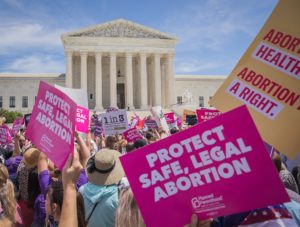Repeal Helms Now
This article is one in a series of articles in March in honor of Women’s History Month.
The United States doled out roughly $40 billion dollars in foreign aid last year, but American dollars don’t come free. Of course, there are strings attached. How we restrict our foreign assistance funding is an explicit statement of what our country values. At their best, the strings are diplomatic tools to broker better lives for the people on the receiving ends. At their worst, they are cruel forms of imperialism.
One of those cruel strings is the Helms Amendment. After the welcome decision on reproductive health rights by the Supreme Court in Roe v. Wade, Congress swiftly passed the Helms Amendment, which nearly 50 years later, still prohibits U.S. foreign assistance funding from supporting abortion care. The amendment is monolithic in superseding local law and people’s ability to make their own decisions about their healthcare: it makes no concessions for countries where abortion is legal.
But if the “strings” attached to foreign aid attempt to influence behavior, the evidence has shown time and again that criminalizing abortion or cutting off funding doesn’t reduce the number of abortions. Abortions will happen whether they are legal or illegal, whether our country funds them or not. There are 25 million unsafe abortions each year, accounting for 45 percent of all abortions, and almost all unsafe abortions are performed in low- and middle-income countries that receive U.S. foreign assistance. The bottom line is that the Helms Amendment kills: unsafe abortions are one of the leading causes of maternal death around the world.
But statistics aside, the Helms Amendment is a reminder—if we needed one—that colonialism is alive and well. It’s a reminder of one of the ways the United States government continues to police the bodies of black and brown people, especially women, around the world through their most personal healthcare decisions. These arbitrary restrictions espouse a religious and non-evidence-based agenda with astounding global impact.
If the Helms Amendment were repealed, the Guttmacher Institute has estimated that there would be 19 million fewer unsafe abortions, 17,000 fewer maternal deaths each year, and 12 million fewer women requiring medical interventions for complications related to unsafe abortions. Ultimately, the number of maternal deaths due to abortion would drop by 98 percent.
So how do we get there? Yesterday, the American Humanist Association joined partners around the country to celebrate the reintroduction of the Abortion is Health Care Everywhere Act, which if enacted would cut the strings of the Helms Amendment. The bill affirms that “safe abortion is a critical component of comprehensive maternal and reproductive health care and should be included as part of foreign assistance programs funded by the United States Government” before striking the Helms Amendment from code and replacing it with language that states that U.S. foreign assistance “may be used to provide comprehensive reproductive health care services, including abortion services, training, and equipment.”
Everyone deserves the safety and dignity of basic health care. And now is our chance to put the Helms Amendment behind us. For more information and to get involved visit repealhelms.org.
And if you are interested in getting involved in reproductive justice within the United States, I encourage you to join the AHA Center for Education’s upcoming educational series on reproductive justice led by Colleen McNicholas, the chief medical officer of Planned Parenthood of the St. Louis Region and Southwest Missouri, and Pamela Merritt, the executive director of Medical Students for Choice. It will kick-off with Critical Minds on April 20 at 7 PM ET as an introduction to reproductive justice and its intersections with race, class, and gender politics (free to the public with the recording made available on the AHA’s YouTube Channel and the Critical Minds webpage). Then a two-part Further Reflection paid course will provide a dive deeper into the topic with small group discussions. Part one on April 27 will focus on the erosion of access to abortion in the U.S. as criminalization increases. And part two on May 4 will equip participants with the skills needed to engage in their own courageous conversations about reproductive and sexual health. More details coming soon to americanhumanistcenterforeducation.org.

